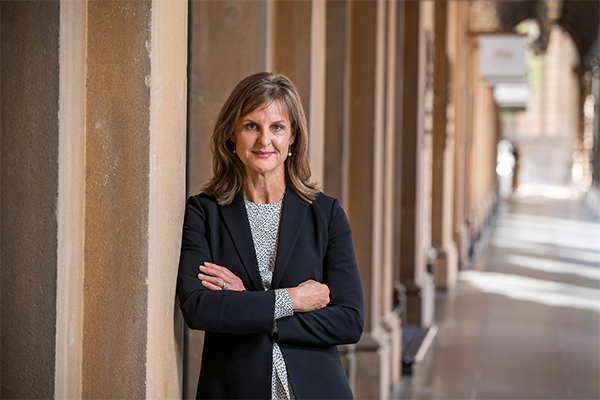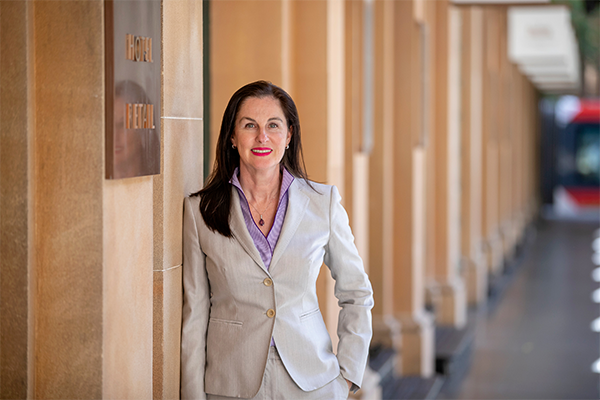Running ahead of risk: introducing APRA’s newest Board Members
Suzanne Smith and Therese McCarthy Hockey became Executive Board Members of APRA in October last year. Their paths have run parallel since they became APRA Executive General Managers in 2019 and 2018, respectively, and most recently in each securing a top position on the Board overseeing the country’s financial services landscape. The two, who are also jogging buddies, recently caught up with Insight to run through their transition to APRA Members so far.

You have been Executive Board Members of APRA for four months. Therese, you have responsibility for the banking sector; Suzanne, you have responsibility for the life insurance and private health insurance sectors. How has that time been?
Suzanne Smith (SS): Is it four months already? Firstly, I would say it is a real privilege to serve as an APRA Board Member, leading an organisation of passionate and committed financial service experts. I have enjoyed the challenge that comes with picking up the leadership of the private health and life insurance industries but also pleased to be able to draw on my deep experience from the superannuation industry; since many of the challenges, such as board governance, sustainability and cyber security, are not unique.
Stepping up to the Member role has certainly been helped by having held several executive roles in APRA prior to the move. We have spent time focused on ensuring APRA is well positioned for the future and, as part of this, we announced some changes to the organisational structure.
Therese McCarthy Hockey (TMH): Suzanne and I have benefitted from our prior executive roles and have had a shared interest in making sure the organisational aspects were right in order to hit the ground running.
APRA celebrates its 25-year anniversary this year. I am very honoured to take on such an important role with an organisation that has delivered on its mission throughout that time. That mission – to build a resilient financial system for the benefit of Australians – permeates everything we do.
APRA and the entities we regulate weathered the storm of the global pandemic. To take the helm of an organisation that was able to do so – and be lucky enough to have a dedicated team of people who really want to be part of that mission – can only be described as a rare opportunity which I’m keen to build upon for the future.
What have been your top priorities since assuming responsibility for overseeing banking (Therese) and life and private health insurance (Suzanne)?
TMH: Member responsibilities for the banking industry is an extension of my previous role, so I am familiar with the issues. As we look forward to uncertain times, my intention is to increase my engagement with industry to focus on the resilience of the system to withstand shocks and emphasise the importance of banks working with their customers. Keeping watch on issues and risks as they arise is a must; it’s so important for navigating the environment as well as delivering on our supervisory and policy priorities, which are set out each year in our plan to industry.
Having assumed this new role, another focus is to foster more links between APRA and peer agencies and other parts of government to improve connection and understanding. Fundamentally, it is our responsibility to demonstrate not only to elected officials but all Australians that APRA delivers on its mandate and that we are transparent and accountable.
SS: Starting any new role always involves a period of transition and, for me, it has been about getting to know our APRA insurance teams better, engaging with key stakeholders, understanding the key issues facing the insurance industries, and listening to a broad range of views and concerns both internal and external to APRA.
My move to take responsibility for overseeing the private health industry coincided with a major cyber-attack on one of our regulated entities, so that was certainly an intense time as we worked with a whole-of-government team to understand what was happening. An attack such as this was always a matter of “when” not “if”, and it is essential that the broader industry considers deeply the learnings from this event and ask, “could this happen to us?”. It is a focus for me and the wider APRA team to continue to push entities to elevate what they are doing with regards to cyber resilience.
You've assumed responsibility for supervising these industries at a challenging time, amid geopolitical risks, high interest rates, inflationary pressures and major cyber security breaches. Are you confident that APRA’s regulated entities are equipped for the financial tests they may face?
SS: We have been talking to boards for some time now about these types of risks and the role that they have in steering their entity through these times. Therese mentioned the importance of entities being able to withstand these external shocks and, in order to do this, it is critical for boards to really understand their businesses; beyond just financial resilience, and ensure they have the right skills, capability and breadth of experiences on the board to craft and drive their strategies. Those boards that understand those risks and how sensitive they are to different events will be best positioned for the future.
APRA’s supervisors are delivering these messages to entities consistently and we try to remind the industries at a broader level through our publications and speeches. Unfortunately, entities that are not prepared to listen, learn and adapt will face the toughest road ahead.
TMH: It’s all about preparedness and being ahead of a crisis. There are two professional lessons I’ve learnt from the COVID pandemic as well as the preceding stresses of the global financial crisis, the European banking crisis and Brexit. The first is the importance of good planning for a range of scenarios; the second is the value of stress testing. Every crisis is unique but there are common elements and we can use our experiences to our advantage.
Although we can rarely be absolutely certain of what crisis is lurking around the corner, we can prepare, and that is what APRA expects from its entities. It is essential to build a repertoire of mock scenarios (severe yet plausible) and do the work in advance. The more you can foresee, the more equipped you are, the more likely you are to overcome a crisis.


Is there a particular current or potential financial risk that keeps either of you awake at night?
TMH: The truth is we spend the daylight hours preparing for known and emerging risks so that we can sleep at night! The scale of preparedness is largely thanks to a great team of people at APRA, who ensure that processes are in place for when we need to respond to a new crisis.
SS: Cyber risks continue to worry me, especially given what we have seen in recent times – what starts as data theft very readily translates to significant financial risk.
Before joining APRA, both of you had highly successful careers in the financial sector – Therese in banking and Suzanne in banking, superannuation and life insurance. What made you want to cross the fence to become a regulator?
SS: For me, it was a sliding-doors moment, as I was considering another career move. A chance conversation led me to realise the value and opportunity of having executives with broad commercial experience working for the regulator and how I could use this to work to strengthen the financial system in Australia. Entities I have engaged with since joining APRA have appreciated that we have walked in their shoes and understand the challenges of running a business and the potential impact and impost of changes to regulation. I am able to bring different dimensions to the decision-making process within APRA. What I have loved about APRA since joining is the passion of our people around the purpose of the work we do and the intellect, and the drive they have to really make a difference.
TMH: For me, the major difference between the private and public sectors is the end goal. At APRA, there’s none of the bottom-line pressure that’s evident in the private sector; nevertheless, the mission comes with a hefty responsibility. Protecting the financial stability of the system for the benefit of the Australian community is a mission that resonates with people who chose to work at APRA. It permeates everything we do and attracts the kind of people that recognise the value of what they bring to the table and how that contributes to the bigger picture. My experience is that the public sector has among it some of the most skilled and talented people I have come across.
How have your industry experiences been useful to your roles at APRA? Does it leave you or APRA open to accusations of “industry capture”?
TMH: By nature, financial markets are constantly evolving. The industry is rarely at a standstill, given the injection of new ideas, new market forces, new global and geopolitical dynamics – not to mention the next generation of thought leaders, innovators and disruptors.
The foundations I have established from previous roles in industry, both locally and internationally, have given me insight into the functioning of banks but none of us can rest on our laurels. This executive board role – as all roles across the economy – demands a growth mindset. It is essential to look ahead and adapt.
SS: Prior experience gives you perspective. It allows you to appreciate the issues faced by industry from another viewpoint, and to consider that as we execute on APRA’s regulatory agenda.
When you have been in financial services for as long as I have, you will always know people on the other side. In our roles, we are guided by the strength of our regulatory framework, our obligations to manage conflicts, and the professional skills we have as executives. When you are making data-led decisions, and basing conversations and decisions on the facts, it provides the anchor or guard rails around how we do our work.
This is the first time in APRA’s history that the majority of APRA Members are women. In 2023, are those statistics still noteworthy or has the industry significantly progressed in terms of gender representation across all levels?
SS: The gender profile of our Executive Board is certainly different now and I am excited to be working with such capable executives that bring a lot of diversity to the table, beyond just gender. As we know, gender is just one aspect of diversity and it is the experience, backgrounds and ways we think and approach problems that also makes this a great team.
TMH: A drawcard for me in joining APRA was its emphasis on inclusion, and it is an important cultural marker of what we do. When Suzanne and I became Executive Directors at APRA in 2019, there were few other females leading at that equivalent level, among them was Helen Rowell, who is a fellow Board Member and Deputy Chair. Where we are today – with four women at the Member level (including Deputy Chair Margaret Cole) and more women as Executive Directors – can be credited to APRA’s culture of inclusion. It is about cultivating representation through the ranks over time, and APRA has made great progress. There is still a lot of change to be made within the industry.
SS: The superannuation industry, for example, has made great strides, where we are seeing women as chairs and CEOs of super funds. Conversely, in the insurance industry – as of this week – there are no female CEOs of a life insurance company in Australia. So, what we are seeing is different industries moving at a different pace when it comes to recognising the value of gender diversity.
Suzanne, you are leading the charge on the running front; how did that come about? What is the likelihood of convincing Therese to run a marathon?
SS: I started running in my teens and I find it good for mental health and physical well-being. I love running with my adult children and it is a great way to see cities when you travel and stay fit while catching up with friends. I have also joined in, on occasion, with one of our APRA running teams which has been a lot of fun. Given convincing Therese to run a marathon would involve me doing it – it’s unlikely! Even the training to run a marathon is likely to result in injury for me!
TMH: I do have some triathlons under my belt but that was a while back and I am now catching up with my fitness, and I am pleased to say my daughter and I work out together at our local gym. Suzanne and I both feel strongly about the benefits of exercise to overall health. Last September, we were part of a fitness challenge in which over 160 APRA staff participated to raise money for charity. The chances of running a marathon? Unlikely, but you never know!
Media enquiries
Contact APRA Media Unit, on +61 2 9210 3636
All other enquiries
For more information contact APRA on 1300 558 849.
The Australian Prudential Regulation Authority (APRA) is the prudential regulator of the financial services industry. It oversees banks, mutuals, general insurance and reinsurance companies, life insurance, private health insurers, friendly societies, and most members of the superannuation industry. APRA currently supervises institutions holding $9.8 trillion in assets for Australian depositors, policyholders and superannuation fund members.